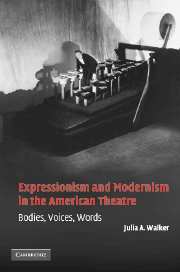Book contents
- Frontmatter
- Contents
- List of illustrations
- Acknowledgments
- Part I Introduction
- Part II Introduction
- 4 The “unconscious autobiography” of Eugene O'Neill
- 5 Elmer Rice and the cinematic imagination
- 6 “I love a parade!”: John Howard Lawson's minstrel burlesque of the American Dream
- 7 Sophie Treadwell's “pretty hands”
- Epilogue: “modern times”
- Notes
- Works cited
- Index
6 - “I love a parade!”: John Howard Lawson's minstrel burlesque of the American Dream
Published online by Cambridge University Press: 22 September 2009
- Frontmatter
- Contents
- List of illustrations
- Acknowledgments
- Part I Introduction
- Part II Introduction
- 4 The “unconscious autobiography” of Eugene O'Neill
- 5 Elmer Rice and the cinematic imagination
- 6 “I love a parade!”: John Howard Lawson's minstrel burlesque of the American Dream
- 7 Sophie Treadwell's “pretty hands”
- Epilogue: “modern times”
- Notes
- Works cited
- Index
Summary
Unlike o'neill and rice, john howard lawson never explicitly disavowed any German influence on the writing of his expressionist plays. But, given the American vocabularies at work in his expressionist play Processional, subtitled “A Jazz Symphony of American Life” (1924; 1925), he didn't have to. “‘Processional’ is America,” Heywood Broun declared in his 22 February 1925 column in the New York World. “It is the first genuine view of America that I have ever seen on the stage.” Most critics agreed. Even the stodgy Drama League praised the play for “the superabundant vitality of contemporary American life [that is] pictured here with immense gusto and by a method that smacks rather of vaudeville and revue than of the ‘legitimate’” (Playlist 1/26, JHLP “Clippings”). When reviewers mentioned German expressionism at all, they tended either to fault the production for not borrowing enough from the form or to hail Lawson for “turning it to his own uses.” That the play was fundamentally American in style was never really in question.
Lawson himself helped to propagate this understanding of the play's formal origins. In his opening notes to the published version of the play, he boasts that he has “endeavored to create a method which shall express the American scene in native idiom, a method as far removed from the older realism as from the facile mood of Expressionism” (Lawson, Processional v).
- Type
- Chapter
- Information
- Expressionism and Modernism in the American TheatreBodies, Voices, Words, pp. 188 - 210Publisher: Cambridge University PressPrint publication year: 2005



